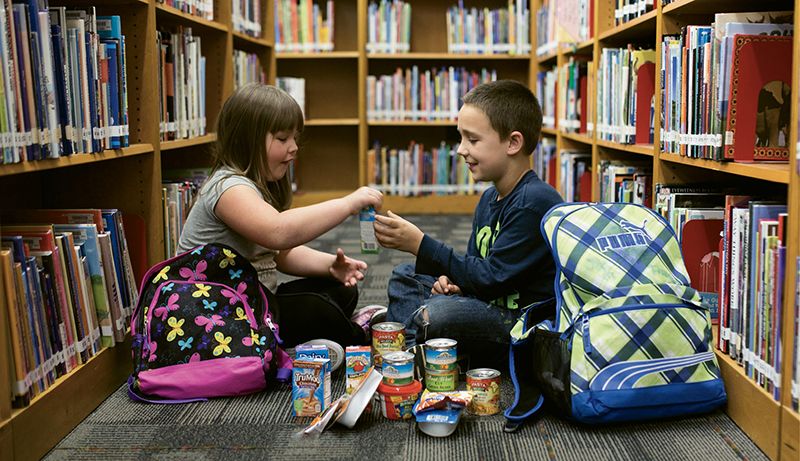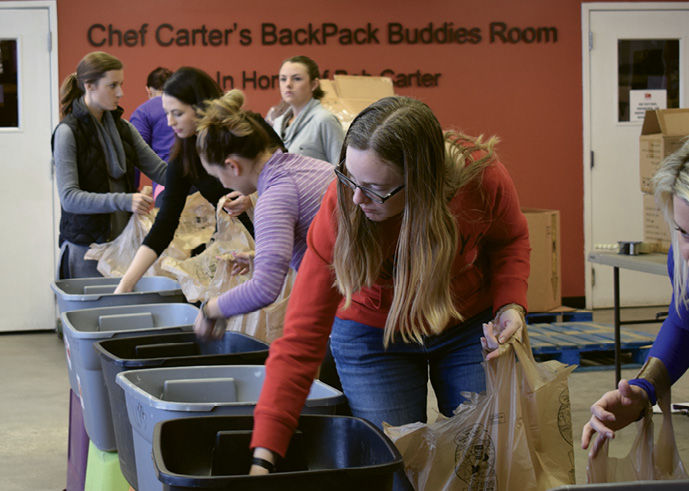Lowcountry Food Bank’s BackPack Buddies feeds a need every weekend

BackPack Buddies serves just over 3,600 children per week during the school year, including two schools that assist childen who are homeless or transient.
Sunday suppers may fill the hearts and bellies of some, but for one in five local children, the evening marks day two of an empty stomach. “Thousands of Charleston-area students receive free or reduced-price breakfasts and lunches at school, but those may be the only meals they can count on,” explains Erin McDonough, Child Hunger Program Coordinator at Lowcountry Food Bank (LCFB). To fill the weekend gap, LCFB’s Backpack Buddies has partnered with the nation’s largest domestic hunger-relief organization, Feeding America, since 2006.
The program began in Little Rock, Arkansas, in 1995, when a school nurse became concerned about hungry children visiting her clinic. In 2000, Feeding America picked up the concept, which has since been replicated in more than 40 states because of its effectiveness in addressing childhood hunger.
Here in the Lowcountry, the organization serves 3,600 students in need by volunteers discreetly slipping food kits into kids’ backpacks every Friday. Recipients receive four pounds of easy-to-prepare meals and snacks balanced across the five food groups. McDonough works closely with a nutrition team to ensure the packs meet the dietary needs of elementary school-age students. Rather than rely on donated goods, BackPack Buddies gets provisions through Feeding America, where gift and grant dollars stretch further than at a typical grocery. Just five bucks supplies two entrées (think canned pasta), two servings of whole-grain cereal along with shelf-stable milk, one single-serving fruit cup and one veg, a dried fruit, low-fat pudding, and whole-grain cookies. Coordinators double-up on food kits during the weeks prior to Thanksgiving, winter, and spring breaks.

BackPack Buddies is always looking for volunteers to help sort donations. To sign up, visit lowcountryfoodbank.org/get-involved.
Like the nurse who founded the organization, BackPack Buddies counts on school staff members such as teachers, nurses, counselors, and family liaisons to identify which kids might benefit from enrollment and obtain permission from their parents. “These educators know how to spot the signs of food insecurity, such as hoarding and lethargy,” says McDonough. “There really isn’t a stereotype when it comes to childhood hunger. For example, a child may be suffering from obesity and still be food insecure. So we zero in on specific, telltale behaviors.”
Hunger pains can quickly affect a child’s ability to concentrate. To remove that stress, BackPack Buddies delivered some 136,800 food packs during the 2018-2019 academic year. And schools are savoring the results. In an anonymous survey conducted at the close of the year, 100 percent of the program’s partners reported improvement in participant behavior and academic performance.
Each package is put together by community members, including LCFB volunteers and sponsoring businesses, churches, and nonprofits. For those interested in hands-on helping, LCFB offers assembly shifts five days a week, as well as one on Saturday and Tuesday.
“If you’re looking over a gymnasium full of kids, you can’t identify which kids are in the program,” stresses McDonough. They’re just like any other children—full and ready to learn.
Photographs courtesy of Lowcountry Food Bank